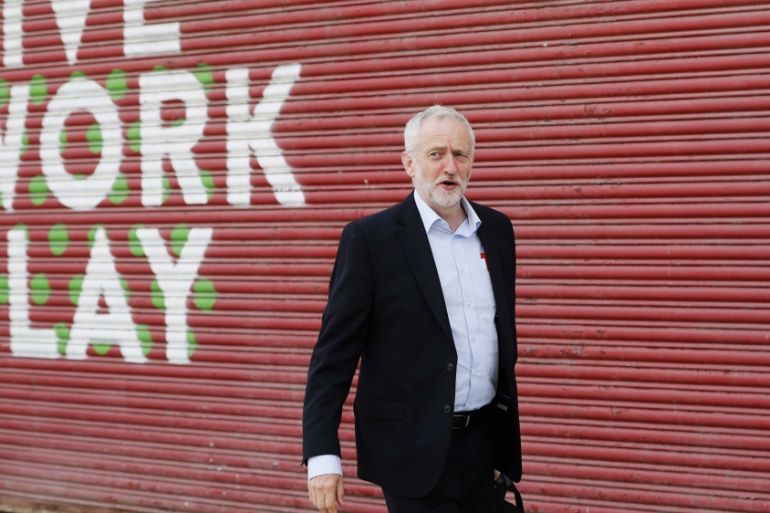Corbyn: We have to admit ‘war on terror’ is not working
As election campaigning restarts following Manchester attack, UK opposition leader addresses root causes of ‘terror’.

Britain’s foreign policy and intervention in wars abroad had fuelled the threat of “terrorism” at home, the leader of the UK’s main opposition party said on Friday, as a political truce after a Manchester suicide attack came to an end.
Less than two weeks before a general election, Labour leader Jeremy Corbyn also vowed to reverse Prime Minister Theresa May‘s police cuts and give the security services more resources if they needed them, saying Britain could not “be protected on the cheap”.
Keep reading
list of 4 itemsUS secretly sent long-range ATACMS weapons to Ukraine
Russia-Ukraine war: List of key events, day 791
What happens when activists are branded ‘terrorists’ in the Philippines?
Although Corbyn said he did not want “to make a narrow party political point”, opponents accused him of exploiting Monday’s bombing by Salman Abedi, a Briton born to Libyan parents, who killed 22 people, including children, at the Manchester Arena after a concert by US singer Ariana Grande.
READ MORE: Manchester’s Libyans react to killer in their midst
“No government can prevent every terrorist attack. But the responsibility of government is to minimise that chance, to ensure the police have the resources they need, that our foreign policy reduces rather than increases the threat to this country,” Corbyn said in a speech in the capital, London.
“Many experts, including professionals in our intelligence and security services pointed out the connections between wars that we’ve been involved in or supported … in other countries, such as Libya, and terrorism here at home.”
Corbyn edges higher in polls
May’s Conservatives are leading in the opinion polls before the June 8 election and were widely expected to cruise to a landslide win when she called the vote in April.
But one survey on Thursday suggested their lead had been cut to just five points after she was forced to backtrack on a plan to force elderly people to pay more for their social care.
Corbyn, a socialist and veteran anti-war campaigner, said foreign policy was not solely to blame for “terrorism” but he would shy away from the interventionist approach that has seen the UK join military action in Iraq, Syria, Libya and Afghanistan in recent years.
“We must be brave enough to admit the ‘war on terror‘ is not working,” he said, vowing only to deploy troops when there is a clear need and a plan to secure a lasting peace.
His stance puts him not just at odds with May, who says he would put Britain’s security at risk if he won power, but also many in his own party, including former Labour Prime Minister Tony Blair who led Britain into wars in Iraq and Afghanistan.
OPINION: UK’s snap elections – The Corbyn factor
“I think his timing is incredibly disappointing and crass given there is a live police operation,” Security Minister Ben Wallace told BBC radio. “I don’t think the substance of what he says is correct at all.”
Corbyn, who has already pledged 10,000 extra officers, also promised to reverse police cost-saving measures, many brought in by May in her former role as interior minister. Britain now has fewer officers than in 2001.
Amber Rudd, the interior minister, rejected suggestions cuts had hindered the authorities’ ability to prevent Monday’s attack.
“We must not imply that this terrorist activity wouldn’t have taken place if there had been more policing,” she said.